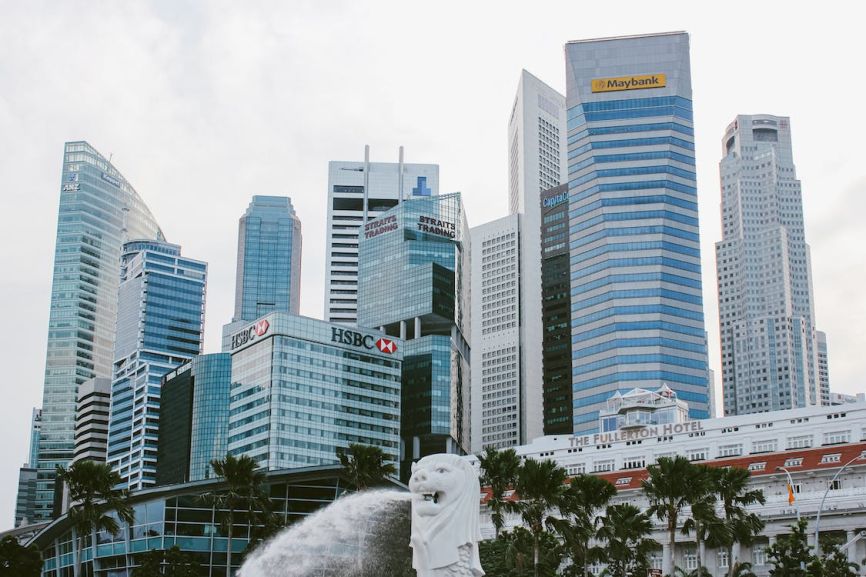Singapore is Asia’s business ground zero and is gaining ground on Hong Kong as the continent’s financial epicenter with the underlying challenges faced by the Chinese territory. Many economists widely regard Singapore as “the land of opportunity,” urging global investors to consider Singapore citizenship by investment.
In recent years, several well-known investors and businesses have relocated to Singapore. Dyson moved its headquarters to Singapore in 2022, as well as high-profile people such as Eduardo Savrin and Jackie Chan, further establishing the microstate as a hotbed for globally successful individuals and corporations.

But is it possible to obtain Singapore citizenship by investment? Acquiring Singaporean citizenship is more complex than in some countries that grant citizenship by investment; however, there are avenues allowing foreign entrepreneurs to invest in the country and become permanent members of the Singaporean establishment.
The Benefits of Becoming a Singaporean Citizen
Its optimal business ecosystem is just one of many reasons people are drawn to Singapore. Although the country is small, the benefits bestowed on its citizens are vast.
A powerful passport
The Singapore passport is among the strongest on the Global Passport Index, providing visa-on-arrival and visa-free access to 174 countries worldwide.
Educational incentives
Singapore’s reputable education system is free until high school, after which it is generously subsidized. The quality of education is outstanding at every level, and students are encouraged to further their education through access to many incentivized scholarships and grants.
Access to the world’s best healthcare
The heavily subsidized healthcare system in Singapore is ranked as the best in the world on the Legatum Prosperity Index (LPI); the services received by its residents are second to none.
Considerable access to social support
The Singaporean government is very supportive of its citizens, considering all the financial liabilities related to maintaining a good standard of living. Citizens have access to Singapore’s Central Provident Fund (CPF), which is contributed to by employees and employers. This fund can be used for anything, from supplementing education to buying a house.
An attractive tax regime
Personal income tax in Singapore is among the lowest in the region. Tax regulations are imposed at progressive rates. A citizen earning $120,000 would be liable to pay just 15 percent tax on the amount earned above $80,000.

About the Singapore Global Investor Program
Singapore’s Global Investor Program (GIP) was introduced in 2004 to attract foreign investors who could contribute to the nation’s economic growth. The GIP is a type of Golden Visa that offers permanent residence status for expats and their families in exchange for a business-related investment in the country’s economy.
Eligibility criteria for the Singapore Global Investor Program
To qualify for the GIP, you have four options for eligibility, each of which has its own criteria for qualifying. The four eligibility options are:
Established business owners
- Applicants must possess a minimum of three years of certified entrepreneurial and business experience
- The applicant should presently be running a corporation with a minimum annual turnover of SGD 200 million ($150 million) on average for three years and in the year immediately preceding their application.
- If the corporation is privately owned, the applicant should possess at least 30 percent shareholding in the company.
- The corporation must be involved in one or more of the industries listed under Annex B.
New-generation business owners
- The applicant’s immediate family members should possess at least 30 percent shareholding or be the largest shareholder in the company used to apply.
- This corporation’s annual turnover must be at least SGD 500 million ($375 million) on average for three years and in the year immediately preceding their application.
- The applicant must be part of the management team of the corporation.
- The corporation must be involved in one or more of the industries listed under Annex B.
Founders of fast-growth companies
- The applicant must be a founder and one of the largest individual shareholders of a non-publicly listed company valued at least SGD 500 million.
- The company must receive investment from reputable venture capital and private equity firms.
Family office principals
- The applicant must have at least five years of certified entrepreneurial, investment, or managerial experience.
- The applicant must have at least SGD 200 million in net investable assets.
(Net Investable Assets is the value of your assets after calculating the value of liquid/near-liquid assets, such as stocks, shares, and cash, and subtracting consumer debt owed).
Singapore Global Investor Program Investment Options
Three investment options qualify for the Singapore GIP.
Option A: A minimum investment of SGD 10 million ($6.04 million) in a new business entity or the expansion of an existing commercial entity in Singapore.
Option B: Invest SGD 25 million ($15.09 million) in a GIP-select fund that is also an investor in Singapore-based companies.
Option C: Open a Singapore-based Single-Family Office (SFO) with managed assets (Assets Under Management) of at least SGD 200 million; A minimum of SGD 50 million ($30.18 million) must be deposited in any of the four following investment categories:
- Equities, REITS (Real Estate Investment Trusts), or company trusts listed on Singapore-approved exchanges
- Qualifying debt securities listed on MAS’ (Monetary Authority of Singapore) inquiry system
- Funds distributed by Singapore-licensed financial institutions
- Private equity investments in non-listed companies based in Singapore
Investment options may include other prerequisites, such as submitting a detailed five-year business plan with projected employment, expenditure, and financial data.
Any new or existing business operation established in Singapore must be involved in approved business sectors listed under Annex B by the Singapore Economic Development Board (EDB)–the country’s corporate regulatory authority. The following business sectors are included in Annex B; Aerospace engineering, electronics, media and entertainment, medical technology, family office and financial services, logistics and supply chain management, and sports businesses.
Obtaining Permanent Residence Through the Global Investor Program

Acquiring permanent residence status under this investment immigration program is one of the main advantages of investing in a new business entity or existing business in Singapore.
The application process is structured and has several states of approval to ensure only high-quality foreign nationals gain permanent residence.
Investors can apply for the program provided they fit the following eligibility criteria and can present these supporting documents:
- A certified copy of a valid passport
- An original or certified copy of their birth certificate (if applicable)
- A notarized copy of proof of kinship (if applicable)
- Proof of their business track record
- An original or certified copy of their marriage certificate (if applicable)
- Three years of audited accounts of the company used to apply (if applicable)
- The Certificate of Shareholders by the Registrar of Companies (if applicable)
- A certified copy of the company’s business license or incorporation documents (if applicable)
- A Curriculum Vitae
- A Copy of Accounting & Corporate Regulatory Authority [(ACRA) if applicable]
- A business plan
- The receipt of payment of fees
- The undertaking of the terms and conditions of the investment program
Application process
- The applicant submits completed Global Investor Program (GIP) application forms both online and by post to the Singapore Economic Development Board (EDB).
- The applicant is invited for an immigration interview with EDB, where they’ll be asked about their proposed investment plan, their experience as an established business owner, and any other investment conditions in their chosen criteria.
- If the applicant isn’t required to provide further supporting documents and passes the assessment criteria, the Immigration & Checkpoints Authority (ICA) will issue an Approval-in-Principle (AIP) residence permit to the applicant, which is valid for six months.
- The applicant fulfills the investment conditions under their selected investment option within six months from the date of the AIP letter.
- Upon making the requisite investment, the applicant provides evidence of the minimum investment amount (e.g., a certified copy of share certificates, bank statements, and other legal documents) and submits the Investment Undertaking in the terms and conditions of the investment made.
- Once the EDB verifies investment documents, ICA will issue the Final Approval Letter.
- The applicant must validate their status for permanent residence in Singapore within 12 months from the date of the Final Approval Letter.
A GIP application generally takes nine to twelve months to be processed.
Permanent residency for family members
Family members of foreign nationals, including the spouse and unmarried children under 21, can also be included in a GIP application and receive permanent residency in Singapore without the primary applicant paying any additional fees.
Citizenship by Investment in Singapore
After a successful Global Investor Program application, it may be possible for permanent residents to apply for Singapore citizenship by investment in as little as 12 months after the business or investment is established.
Please note that citizenship through this route and within this timeframe is not a certainty. Entrepreneurs must demonstrate exceptional investment growth and above-and-beyond contributions to Singaporean society. Applications also go through a senior level of approval within the Singapore government.
For more information on citizenship by investment, check out our article for a list of countries that offer citizenship by investment.
Alternative Ways to Get Permanent Residency in Singapore
The Singapore Global Investor Program is a high-stakes, high-reward investment immigration scheme that is generally more accessible to wealthy investors or those with a successful entrepreneurial background and access to the finances required for the program.
There are alternative options to obtain a permanent residence permit in Singapore.
Employment Pass
The Employment Pass is the most advanced work visa offered in Singapore. The pass was introduced to allow high-level workers, such as professionals, managers, and executives, to be sponsored by Singapore companies and legally work and live in the country.
Here are some key eligibility criteria for the pass:

- Applicants must have an internationally recognized accreditation
- Applicants must have the necessary high-level experience
- Applicants must have a job offer, and employers must demonstrate they have fairly considered local applicants
- The job must be in a managerial, executive, or specialized role
- The salary offered must be at least $5,000 (or $9,300 for candidates 45 years old and above)
S Pass
The S Pass is a mid-level work visa designed for skilled workers. It has a similar application process to the Employment Pass, but acceptance is based on skilled jobs, rather than management, professional, or executive-based roles. The main differences between the Employment Pass and the S Pass are:
- The S Pass doesn’t require managerial, executive, or specialized experience.
- The S Pass has a lower income threshold of $3,000 ( or $4,500 for candidates 45 years old and above).
- The Employment Pass has no quota requirements, whereas the S Pass has a quota limit of 13 percent of the workforce for the services sector and 20 percent for all other industries.
Foreign Artistic Talent Scheme (ForArts)
The Foreign Artistic Talent Scheme (ForArts) was initiated to enable talented individuals to play a critical role in developing Singapore’s arts and cultural landscape. This would be achieved by a profound engagement with local communities and by contributing to the diversity of arts businesses in the country. Potential applicants must:
- Have relevant training or education in their field of practice
- Have relevant professional experience, with outstanding achievements in the art fields of design, visual, literary, media, or performing arts.
- Have significantly contributed to Singapore’s arts and cultural environment, including a strong track record of local engagements at a leadership level
- Have cemented future plans to be involved in Singapore’s arts and cultural sector
Re-entry Permit
Many Western countries allow residents to live abroad and maintain their permanent residence status indefinitely. In order to demonstrate that you do not intend to abandon Singapore permanent residence, holders must obtain a Re-Entry Permit through the Singapore Immigration & Checkpoints Authority (ICA) before travelling abroad.
A Re-Entry Permit is valid for five years from its date of issuance. If a Singapore resident a with permanent residence permit transitions to citizenship, they’re no longer required to obtain a Re-Entry Permit.
Obtaining Citizenship in Singapore
Citizenship by marriage
The spouse of a Singaporean citizen with at least two years of permanent residency and married for a minimum of two years before the date of application can apply for Singapore citizenship by marriage.
Citizenship by descent
Singapore immigration law for citizenship by birthright functions on the rule of jus sanguinis (right of blood). Any child with a Singaporean parent can apply for citizenship by descent.

Citizenship by naturalization
An individual who has been a Singapore permanent resident for two to six years can apply for Singapore citizenship. You can gain permanent residence in Singapore by:
- Acquiring a work visa (Employment Pass or S Pass)
- Marriage to a Singapore citizen
- Applying through the Foreign Artistic Talent Scheme
Singapore Citizenship Law
Singapore has two specific citizenship laws that are generally absent in citizenship legislation in most countries in the EU and North America.
Dual citizenship: Singapore does not recognize dual citizenship; Anyone applying for Singaporean citizenship would be compelled to relinquish their current citizenship.
National service: Singapore has mandatory military enlistment for male Singaporean nationals and permanent residents. Male citizens and permanent residents between 16 and a half and 50 years old must serve up to 40 days of ORNS (Operationally Ready National Service) per year.
There are exemptions to this ruling, such as health and fitness conditions. It should also be noted that those who receive Singaporean citizenship as mature males (generally age 30 and above) are not subject to mandatory enlistment.
Global Citizen Solutions: How We Can Help
Expats and foreign investors can encounter many difficulties when applying for Singapore citizenship, which is why it is worthwhile to have an expert on hand to provide personalized Singapore citizenship assistance throughout the application process.
Our specialists can help you with the following:
- Minimize the visits you have to make to the designated country
- Have someone who works solely on your behalf
- Reduce the hassle associated with putting your application together
- Acquire insider knowledge from someone with years of experience in the market
Let’s get you moving forward in your quest to obtain Singapore citizenship and a Singapore passport. Get in touch with us to book a free consultation.
Frequently Asked Questions about Singapore Citizenship by Investment
How much do I need to invest in Singapore to get permanent residence?
Founders of fast-growth companies and established and next-generation business owners can get permanent residence through the Singapore Global Investor Program with a minimum investment of SGD 10 million ($6.04 million) in new businesses or existing Singapore-based companies. Family office principals can obtain permanent residence status from a capital transfer of SGD 50 million ($30.18 million).
What kind of business can I start through the Global Investor Program?
There are numerous business sectors you can invest in to be eligible for permanent residency in Singapore through the GIP. A few include; family office and financial services, logistics and supply chain management, marine and offshore engineering, media and entertainment, consumer business, precision engineering, and arts businesses, such as performing arts.
Is Singaporean citizenship easy to get?
Singapore is not one of the easiest countries to acquire citizenship; however, you can enhance your case for Singapore citizenship by investment with a substantial business track record and exceptional contributions to the Singaporean economy.
The Singapore citizenship requirements for naturalization are generally at least two to six years of holding a permanent residency permit before you can submit a citizenship application and acquire a Singaporean passport.


